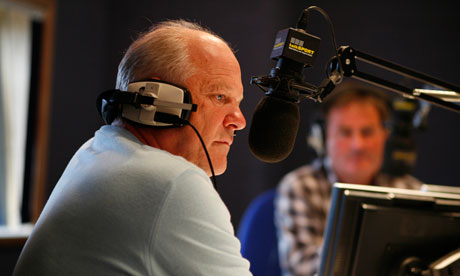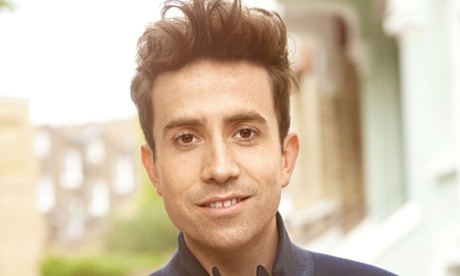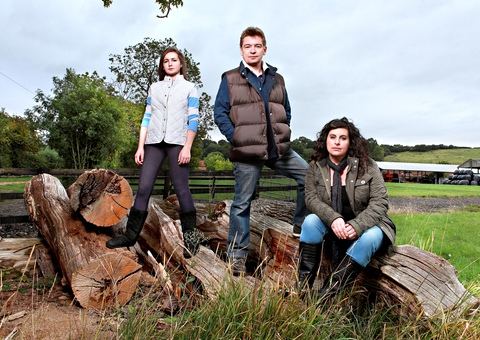Ian Jones, the author of Morning Glory, a history of breakfast television, remembers the excitement of January 1983. He was only seven and something crazy was about to happen. After decades in which Open University and the old test card were as exciting as morning schedules got, the BBC was about to reveal Breakfast Time, the live show that would launch a new era in broadcasting.
“I remember very clearly getting up early on the first morning to see this amazing new thing,” Jones, who is now 42, recalls of the show, first presented by Frank Bough, Selina Scott and Nick Ross. “It felt like such an enormous event.” During the introductions at the start of the first programme, Ross accepted there had been scepticism about the show. “Some people hold a view that television in the morning is decadent and sinful,” he told viewers.
By then, BBC Radio 1 was on its fourth breakfast presenter (Mike Read), and TV breakfast shows were a staple in other countries. But the hype and fascination with which Britain greeted the format has endured as we analyse every coming and going, and rise and fall in early-morning TV. Audiences are increasingly pulled between multiple digital platforms, from increasingly popular current affairs apps and podcasts such as NPR One and Ed Miliband’s weekly Reasons to be Cheerful, to social media. But the terrestrial breakfast show – on radio and television – remains as much a cultural institution as cornflakes.
According to Rajar, which measures radio audiences, 41 million of us still tune in to the radio at some point from Monday to Friday between 6am and 10am. BBC Breakfast and Good Morning Britain, meanwhile still have a total TV audience of more than two million.
There has been much drama to report lately. This morning, Greg James takes over the Radio 1 breakfast microphone from Nick Grimshaw after nearly six years, inheriting a declining weekly audience of more than five million. On Radio 4, falling listener numbers at the Today programme have triggered a new bout of hand-wringing about perceived biases and the idiosyncrasies of John Humphrys. Lauren Laverne’s promotion to breakfast at Radio 6 Music made the headlines when the station announced a reshuffle this month. On Radio 2, Chris Evans continues to pull in vast audiences of more than nine million and, away from the BBC, millions more tune into Nick Ferrari on LBC and Roman Kemp on Capital.
On television, meanwhile, Good Morning Britain is trying desperately to chip away at BBC Breakfast’s audience of around 1.5 million (typically double that of its ITV rival). Under Piers Morgan, its answer is a shinier, louder, more provocative approach than the gentle chumminess of the BBC sofa. Morgan told the Radio Times last month that his mission was to “destroy” the BBC show. Last December, he pulled a hammer from his desk and smashed a BBC Breakfast mug live on air.
The rivalry echoes the early days, when Breakfast Time stole a march on the first Good Morning Britain. The TV-am show on ITV launched a fortnight later with heavyweights including David Frost, Anna Ford and Michael Parkinson. Thirty-five years after Bough and Frost did battle, what is the recipe for a good breakfast in today’s broadcasting landscape, and why are we still obsessed with it?
“I think there is still something magical about it because you are broadcasting to people at their most vulnerable, when they’re like blotting paper,” says Anne Diamond, who joined the TV-am team later in 1983 after its fraught first few months of infighting and vanishing audiences. She and co-presenter Nick Owen later fronted Good Morning... with Anne and Nick on the BBC, and Diamond, 63, is now a regular on ITV’s Loose Women and Channel 5’s The Wright Stuff.
“People still want to know what the agenda is, what people are talking about,” she adds. “They’re still hungry for it and you can still capture a family eating cornflakes before they fracture off and watch different things later in the day.”
Reflecting domestic intimacy with warm informality has been the key to a successful breakfast show. The appearance of desks and dry news on screens has coincided with audience drops. “I don’t understand why Good Morning Britain now has this big desk,” Jones says. “You need the sofas, the cups of coffee. Nobody wants to see a desk before they go to work.”
Starchiness was blamed for TV-am’s initial woes, until the puppet Roland Rat signified a change in direction. Soon the original Good Morning Britain was flying high under the new leadership of visionary Australian TV executive Bruce Gyngell – and raking it in. “Bruce would say things like, ‘let’s do a week live from New York’, and we’d all jump on Concorde,” Diamond recalls of the show’s heyday. “Money was no object and we’d have gazillions of A-listers.” She remembers interviewing a smoking Bette Davis in 1987, and Kirk Douglas.
Channel 4 took its own desk-based approach to breakfast with Channel 4 Daily, which ran from 1989 to 1992. It flopped, so the channel took conviviality to a new extreme with The Big Breakfast, which replaced not only desks but also the whole studio with a real house complete with a kitchen and bedrooms.
As well as the puppets Zig and Zag, the show launched Chris Evans as a titan of breakfast (he occupied the Radio 1 seat in the mid-90s and has presented his Radio 2 show since 2010) and shook up the TV sofa duopoly, at least for a decade, later with Johnny Vaughan and Denise Van Outen as presenters. It was bonkers at times, but then it fizzled out and the breakfast TV slot settled back into a familiar format, with only slight variations in tone and mug design.
Jones thinks morning audiences are instinctively conservative, and that The Big Breakfast was a diversion – albeit a welcome one – from the middle of the road. “I think that’s why BBC Breakfast still does well,” he says. “It’s people sitting on sofas, talking informally, with short items covering a mix of the serious and trivial – exactly the same formula they launched so well with in 1983.”
Politics has always been an awkward part of that recipe, where leaders of the day traditionally come in search of an easy ride, while generally looking as comfortable on the sofa as a rabbit on a parrot’s perch. “I remember David Steel being so thrilled to look like a cosy politician that he spilt his tea down his front,” Diamond recalls. More recently, defence secretary Gavin Williamson looked shocked when Richard Madeley, standing in for Morgan on GMB, ended a live interview when the MP dodged a tricky question.
But does the sofa setup suit these factured new times, when we watch Piers Morgan giving President Trump a soft-soaping on Air Force One, or Love Island’s Hayley “what’s Brexit?” Hughes cosying up with Nigel Farage on post-breakfast show This Morning? Diamond thinks so, and credits Morgan with bringing in big guests. “The only trouble is it’s not always getting noticed because the audience isn’t big enough,” she adds.
There may be signs in the audience figures, however, that porridge and politics are no longer so easy to digest together. Music-led radio breakfast shows, punctured by news bulletins and easy chat, are thriving. “When we launched Chris’s breakfast show in 2010 we knew people listened to the breakfast show on average for 12 minutes,” says Helen Thomas, Evans’s long-time producer and now head of content commissioning at Radio 2. “We wanted that to be 20 minutes and we knew that in that time, we had to inform them, make them laugh, give them something to share at the water cooler - and give them some music to lift their spirits.”
Evans repeats that cycle, if not the content, throughout his show – and it works. As the Today programme suffers, losing more than 800,000 year on year this spring, while the news-led 5 Live Breakfast lost more than 300,000 listeners, Radio 2 still pulls in the crowds. “I think we do escapism well,” adds Thomas, who says Evans’ biggest crossover audience is with Radio 4. Others may have switched from 4 to Radio 3, where the breakfast show gained the same number of listeners the Today Programme lost in the first quarter of this year. The latest audience figures reveal rises for the breakfast shows on Absolute Radio, Kiss, Capital and Radio X, which all focus on music.
Jeff Smith, head of music for Radio 2 and 6 Music, and for Radio 1 and Capital Radio before that, believes in the power of music to reflect the national mood. He remembers being at Radio 1 the Monday morning after Princess Diana’s death in 1997. “The normal approach to royal deaths had been to play classical music, but I’d been thinking about how a station targeted at young people would reflect something like that,” he says. He’d made a short playlist of down-tempo tracks by Moby, Zero 7, as well as You Have Been Loved by George Michael.
But Diamond rejects the notion that we may be leaving talk breakfast shows in search of something more tuneful: “I think people still want to know what’s being talked about each morning and a good breakfast show still does that like nothing else.”









